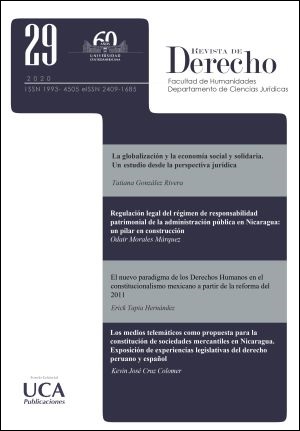The new paradigm regarding Human Rights in Mexican constitutionalism as of the 2011 reform
DOI:
https://doi.org/10.5377/derecho.v0i29.10620Keywords:
Human Rights, Neoconstitutionalism, 2011 Constitutional Reform, Law teachingAbstract
This paper focuses on the significance that the 2011 reform had in Mexican constitutionalism, as well as its repercussion on the topic of human rights. The thesis suggests an interdisciplinary analysis of the implications the reform had in our legal system, embodied by normative hierarchy, the ramifications of the term “human rights”—as well as the study of its limits on both the national and international order—, and the transition between theory and practice. The aforementioned elements will enable us to solidify the need of implementing a new justice prototype, which prompts a change in the paradigm of the way we understand, analyze, discuss and apply the law. Furthermore, this paper aims to stress the importance of the tools provided by subjects such as juridical argumentation, logic, methodology, and interpretation within the framework of this new paradigm.
Downloads
1571
Downloads
Published
How to Cite
Issue
Section
License
© Copyright Universidad Centroamericana (UCA)
The author undertakes not to submit any article to any other journal or publication simultaneously.The content of the research article is the sole responsibility of the author, as a result, the Law Journal is released from any responsibility derived from the content of the work.
The author assigns the Revista de Derecho, the right to publish the article, distribute it and market it in the way he considers convenient, nationally and internationally, in printed and electronic format;as well as its inclusion in directories, bibliographic bases and international indexes.

This work is licensed under a licencia de Creative Commons Reconocimiento-NoComercial-CompartirIgual 4.0.




